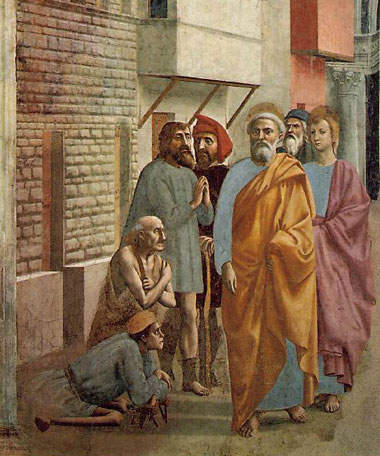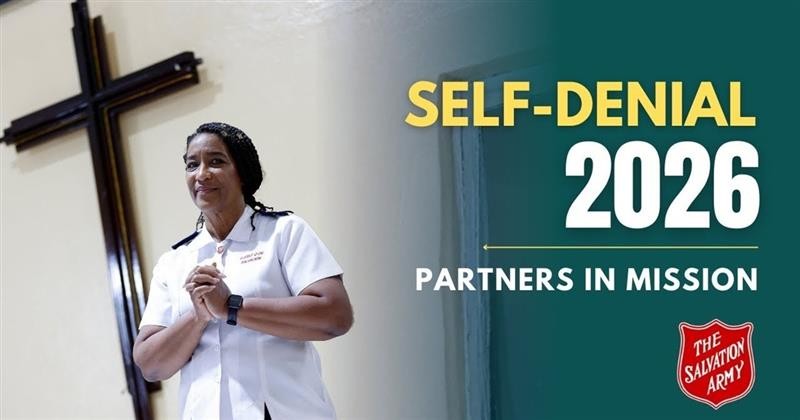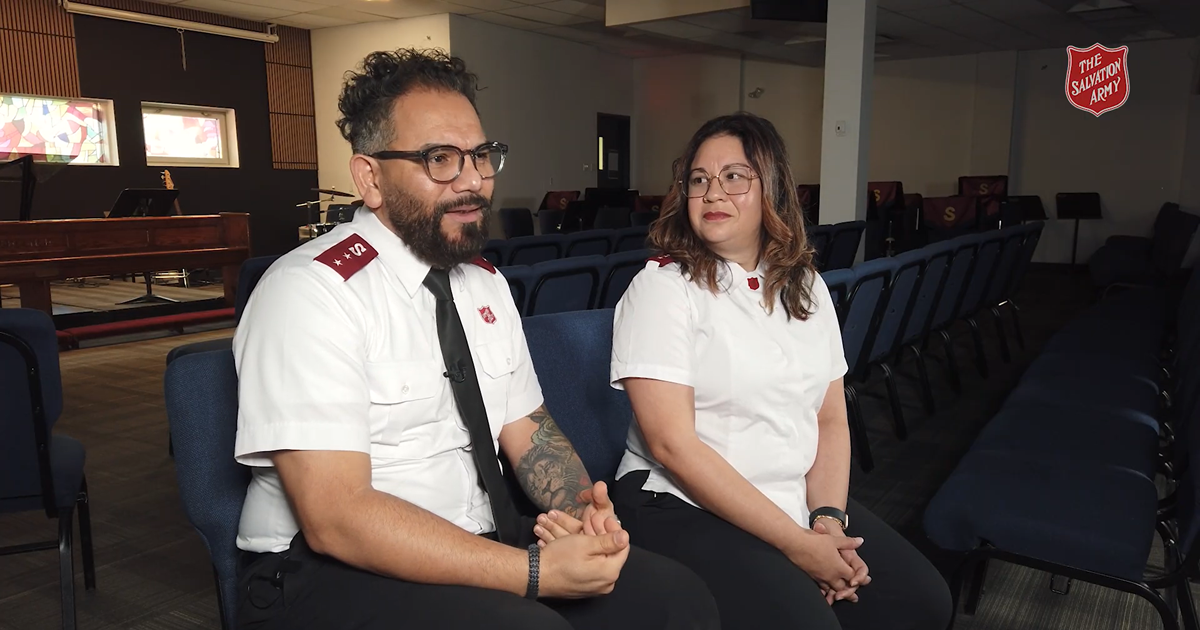 “Silver and gold have I none; but such as I have give I thee:
“Silver and gold have I none; but such as I have give I thee:
In the name of Jesus Christ of Nazareth rise up and walk”
There is a good chance that lifelong Salvationists have found themselves singing the tune that accompanies the preceding words, poetry written to celebrate the wonderful story of healing at the Gate Beautiful (Acts 3:1-10).
A poor crippled man sits outside a temple begging alms from the attending worshippers. They regularly give to the man, in part from compassion, in part hoping to create merit in the eyes of a watching God. Two such men, Peter and John, having recently chatted intimately with the resurrected Jesus, are filled and drenched in the power of his life-giving Spirit. When they arrive on the scene, the cripple asks for alms, his hands out, his head bowed in humble supplication. Peter and John stop, look deeply into the beggar's eyes, declare their fiscal bankruptcy, and grab his hand. Then, in the name of the resurrected One, they tell him to get up and walk. The ex-cripple rises and proceeds to exercise his newly rejuvenated legs with some gusto, ensuring everyone knows it is the resurrected One that has done this amazing thing. Worshippers look on―stunned!
There is much in this wonderful historical event to challenge and inform us as we consider the charismatic tradition of the Church. This tradition has had numerous manifestations ranging from supernatural power encounters between Celtic monks and pagan priests, to the Pentecostal Azusa street revival, from which up to one third of all evangelicals can find their roots, to the modern day explosion of the charismatic movement throughout most mainstream denominations. Its focus is around the imminent presence of the resurrected Christ by the person of the Holy Spirit, who visits his people in profound ways to transform, heal and empower for service through the charismata (gifts given by the Spirit). A brief glimpse at the history of our own movement will show that part of our heritage is firmly planted in this tradition.
Back to the story. Two unique events take place that challenge our existing ministry models. First, Peter and John didn't give the beggar any silver or gold. They didn't meet his “presenting” need. They sought to meet his deeper needs, his defining need―that only a gracious, miraculous God could meet. One of the challenges of our fantastic brand reputation and our often healthy capacity to raise “silver and gold” is that we find immense security within it. The temptation to settle for the easy, low-hanging fruit of ministry, fulfil the expectations of the generous public and remain within our faith comfort zones is huge. However, if Peter and John had merely given alms, the man would have remained a cripple and maybe generations of his descendants would have continued to be beggars at the gate.
I fear that we too easily betray the heritage of our forebears within the charismatic tradition when we do the safe and predictable and seek only to address the “symptom” rather than the deeper causes. How many people have walked through the doors of our corps, social service and community facilities desperately in need of a divine touch only to be short-changed with “practical assistance”? Don't misunderstand me, practical support is so important; after all, you can't eat prayer! However there were lots of people, as there are today, who can give silver and gold. What the beggar, and so many in our world today need, is a miraculous touch of God. This is what caused such a public outpouring of praise for God. This is the unique responsibility of the people of God to provide.
The second surprise was the intimacy of the event. Culturally, beggars looked only to the ground and as those deemed unclean by the religious establishment, would never have been touched by the pilgrims walking by. Peter and John had different ideas. They had been schooled in the “roll your sleeves up” class of the Nazarene.
How many people have walked through the doors desperately in need of a divine touch only to be short-changed with “practical assistance”?
The first directive to the beggar was: “Look at me.” Such a strange request to make of someone so broken and ashamed, who for years had known only humiliation and belittlement. In one sense this would have been amazing in its own right, a moment of real encouragement and affirmation that he would have cherished forever. There is something so powerful when we look deeply and compassionately into someone's eyes. A friend of mine describes it as “pouring love into people's souls through the windows of their eyes.” Wonderful though this was, it was only the beginning.
Having declared their lack of finances, Peter orders the beggar to walk and takes him by his right hand to assist in the process. Why did Peter do this? Was he tempted to help God out a bit just in case he was having an off day? Was he insecure in God's ability to hear and heal? It was neither. This was not an act lacking in faith but, rather, one overflowing with intimate compassion. The power was that of Jesus, but the hand was that of Peter, who violated culture and tradition (no doubt causing much offence to the religious establishment) to express the passion of God for the broken. What a fantastic story this is.
Our Movement is held in such high esteem by so many due to our reputation as those who love the unlovable. It doesn't make great copy for public relations campaigns, the reality is that most Salvationists rarely, if ever, engage with those in deep need. Generally we employ professionals to care on our behalf and occasionally would pray for our officers who also do it (recognizing that most officers rarely engage at this level either).
We exist at some distance from those needy souls with whom we are so publicly identified. This detachment from hands-on, looking-into-their-eyes mission for most of our membership is one of our greatest challenges. The Salvation Army metaphor falls apart in our hands and becomes largely nonsensical when expressed in the safe sanctuaries of most of our corps―detached from the battlefield we are called to fight on. I believe that unless this changes we have no viable future, nor in truth should we. In our communities, workplaces and streets there are many hurting people, desperately in need of an intimate touch from the divine one. It is through us that he has chosen to minister this grace.
Salvationists exist at some distance from those needy souls with whom we are so publicly identified
In these days of concern over decline within our conservative, middle-class corps, it could be that we need to do less of what The Salvation Army can already do and get on our knees and attempt to do the things that only God can do through us.
So why is there such an absence of these life-changing encounters in our western Salvation Army ministry (things tend to be a bit different elsewhere)? It certainly doesn't happen in my corps every week. Let me offer a few ideas.
1. Theological ignorance and unbelief―Sadly our Movement is not renowned for its theological rigour and, having been violated by shallow liberal theology in the 60s and 70s, we have many who don't believe God would choose to act in such a way.
2. Sin―Obviously a life dominated by sin and rebellion to God is going to struggle to be a vessel through which the Spirit of God can flow freely.
3. Comfort―The life of faith consistent with God moving in such ways is not the wide and easy way, but rather the tough and narrow one.
To be honest I can personally relate to all three. I struggle with unbelief, habitual sin and my orientation to comfort. I sense I am safe in assuming I am not alone in my struggles. Yet let me suggest one last problem. If this problem is addressed, I believe all the others would be quickly resolved. Simply put, we are not desperate enough for Jesus. We aren't hungry for his Spirit, we have no deep concern for the lost, we don't love him as we should, we have not fully considered the consequences of living in a world bereft of grace because those entrusted with it choose not to express it.
Peter's words were not cheap but, rather, rich and free. They changed a man's life forever. They came from a heart desperate to love, honour and serve the living God. Were our “desperation dial” to move upwards, I sense our lives and ministry would look very different. More importantly, there would be a lot more empty gates.
Photo: Saint Peter Healing, Masaccio









Leave a Comment